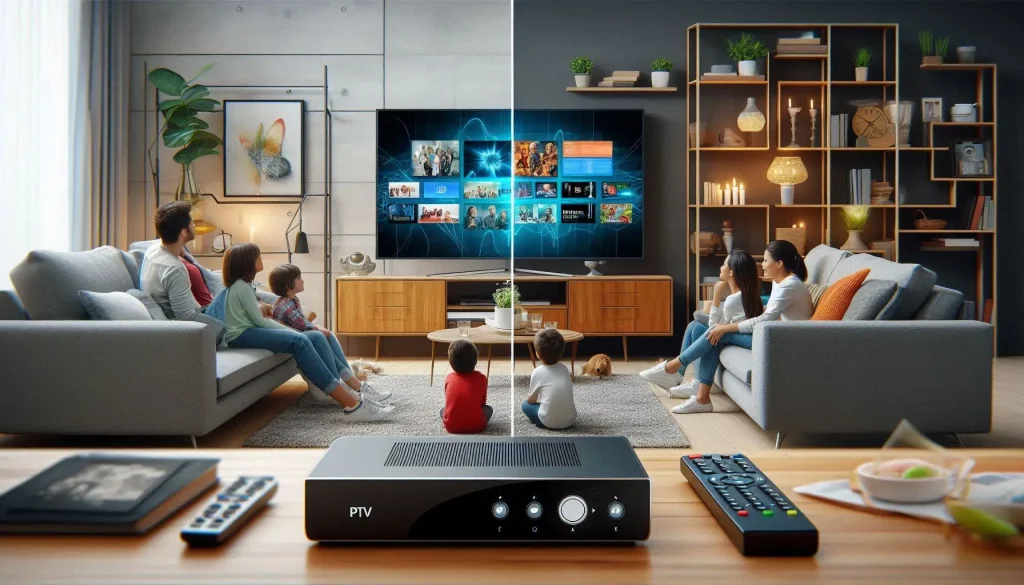In 2025, the debate between IPTV and traditional cable TV continues to be a hot topic among consumers seeking the best value, flexibility, and viewing experience. As technology advances and viewing habits evolve, it’s essential to understand the differences between these two services to make an informed decision.
Understanding IPTV and Cable TV
What Is IPTV?
IPTV (Internet Protocol Television) delivers television content over the internet. Instead of using traditional satellite or cable formats, IPTV streams media content through your internet connection, allowing for greater flexibility and a more personalized viewing experience.wired.com
What Is Cable TV?
Cable TV is a traditional method of delivering television content through coaxial cables. It has been a staple in households for decades, offering a range of channels bundled into packages. Cable TV operates independently of your internet connection, providing a consistent and reliable service.evoca.tv
Comparing IPTV and Cable TV in 2025
1. Cost and Value
- IPTV: Generally more affordable, with basic packages starting around $15-$30 per month. Many IPTV services offer customizable plans, allowing users to pay only for the channels they want. Additionally, IPTV often eliminates equipment rental fees and installation costs.evoca.tv
- Cable TV: Typically more expensive, with basic packages starting around $50-$70 per month. Premium packages can exceed $150 monthly. Cable TV often includes additional fees for equipment rental, installation, and premium channels.evoca.tv
2. Content and Channel Selection
- IPTV: Offers a vast array of channels, including international and niche options. Many services provide on-demand content, allowing users to watch shows and movies at their convenience. Some IPTV providers also offer features like cloud DVR and catch-up TV.reddit.comevoca.tv
- Cable TV: Provides a broad selection of channels, including local and national networks. However, the content is often bundled, meaning you may pay for channels you don’t watch. On-demand options are available but may come at an additional cost.
3. Flexibility and Accessibility
- IPTV: Highly flexible, allowing users to watch content on various devices, including smartphones, tablets, smart TVs, and computers. As long as you have a stable internet connection, you can access your IPTV service from anywhere.
- Cable TV: Limited to the physical location where the service is installed. While some providers offer mobile apps, the experience may not be as seamless or comprehensive as IPTV services.
4. Installation and Equipment
- IPTV: Easy to set up, often requiring only a compatible device and an internet connection. No need for professional installation or additional equipment.
- Cable TV: Requires professional installation and specific equipment like set-top boxes. This process can be time-consuming and may involve additional fees.
5. Reliability and Performance
- IPTV: Performance depends on the quality of your internet connection. A stable and high-speed connection ensures smooth streaming, while poor connectivity can lead to buffering and interruptions.evoca.tv
- Cable TV: Generally more reliable, as it doesn’t depend on internet connectivity. Signal quality is consistent, making it a preferred choice in areas with limited internet infrastructure.evoca.tv+1contentsprout.ai+1
Advantages and Disadvantages
IPTV
Advantages:
- Cost-effective with customizable plans
- Access to a wide range of international and niche channels
- On-demand content and advanced features like cloud DVR
- Flexibility to watch on multiple devicestomsguide.com+5reddit.com+5setplex.com+5evoca.tv
Disadvantages:
- Dependent on internet quality
- May experience buffering during peak times
- Limited reliability in areas with poor internet infrastructurereddit.com
Cable TV
Advantages:
- Stable and reliable service
- Comprehensive channel packages
- Professional installation and supportevoca.tv+1tomsguide.com+1
Disadvantages:
- Higher overall costs
- Less flexibility and customization
- Limited accessibility outside the homeevoca.tv
FAQs
Q: Is IPTV legal in the USA in 2025?
A: Yes, IPTV is legal in the USA as long as the service provider has the proper licensing agreements for the content they offer.
Q: Can I use IPTV on multiple devices?
A: Yes, most IPTV services allow you to use their service on multiple devices, including smartphones, tablets, smart TVs, and computers.
Q: Do I need a VPN for IPTV?
A: While not mandatory, using a VPN can enhance your privacy and security when using IPTV services.
Q: How does the picture quality of IPTV compare to cable TV?
A: IPTV can offer superior picture quality, including 4K resolution, provided you have a high-speed internet connection. Cable TV offers consistent HD quality but may have limited 4K content.evoca.tv
Conclusion
In 2025, the choice between IPTV and cable TV depends on your individual needs and circumstances. If you value flexibility, a wide range of content, and cost-effectiveness, IPTV is the better option. However, if you prioritize reliability and live in an area with limited internet connectivity, cable TV may be more suitable.
For those considering making the switch to IPTV, it’s advisable to try a free trial to experience the service firsthand. Many providers offer 24-hour trials, allowing you to assess the quality and content before committing.
Ready to explore the benefits of IPTV? Try our Free 24-Hour IPTV Trial Now and experience the future of television today!

Pingback: Xtreme HD IPTV: Best 4K Streaming Service in 2025 (10,000+ Channels)